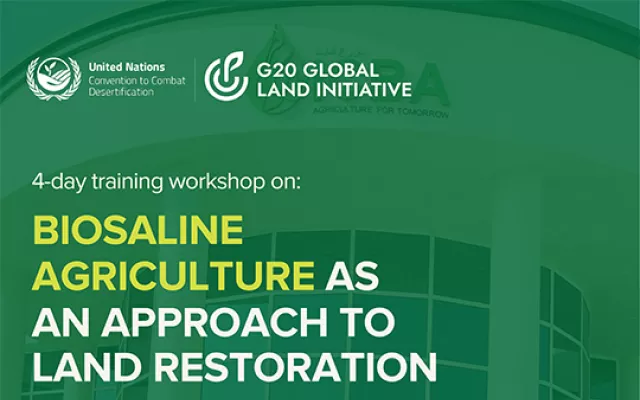Production Systems of Non-conventional Forage Crops
21 November 2013
The International Center for Biosaline Agriculture (ICBA) in collaboration with the UAE Ministry of Environment and Water (MOEW) held a 3 day training course on ‘Production Systems on Non-conventional Crops’, 19-21 November 2013, at the ICBA campus in Dubai.
Dr. Ismahane Elouafi, Director General of ICBA, addressed the participants in the training course in the closing session. She stressed the importance of producing non-conventional forages, which will help decrease the pressure on producing traditional forage crops that require high amounts of fresh water. In the training course, participants learned that the quality of non-conventional crops often equals and sometimes exceeds the quality of conventional crops, especially in the harsh conditions of the UAE. Dr. Elouafi said, “These [non-conventional] crops adapt well within the marginal environment of the UAE; therefore, production using best farm management practices and non-conventional water such as saline water and treated waste water will help supply forages for animals and reduce the dependency on fresh water”.
When asked about the importance of this series of training courses that are being coordinated between MOEW and ICBA, Dr. Elouafi said that this reflects the long term relationship between the Ministry and ICBA and is a sign of the Center’s commitment to the UAE and delivering value added services as a result of our extensive research, which benefits the agricultural sector in the UAE and other regions with similar marginal environments.
Speaking with some of the participants in the course; Eng. Rashid Salem Saeed Halooka, from the MOEW Research Center, expressed his great satisfaction of the knowledge that he acquired over the three days training especially with regards to salt tolerant crops and ICBA’s work on the use of treated wastewater and other non-conventional water. He sees this as a tangible solution for the many farms that suffer from high salinity.
Mr. Kasib Saif Musabah, Extension Worker at the Northern Emirates, expressed his interest in the information he received about the different varieties of salt tolerant forages and the results of the experiments that were conducted by ICBA. He was very pleased with the professionalism of the tutors and the clarity in passing the knowledge.
Mr. Mohammed Ahmed Ismail Alyamani, Extension Worker at the Plant Health Department, believes that many elements that were discussed during this training would be great solutions in tackling the water shortages and the decreasing quality of the available water resources. He enjoyed how the course covered the subject of non-conventional forages from all aspects, starting with planting and best management practices, up to harvesting, conservation, marketing and reaching the consumer.










